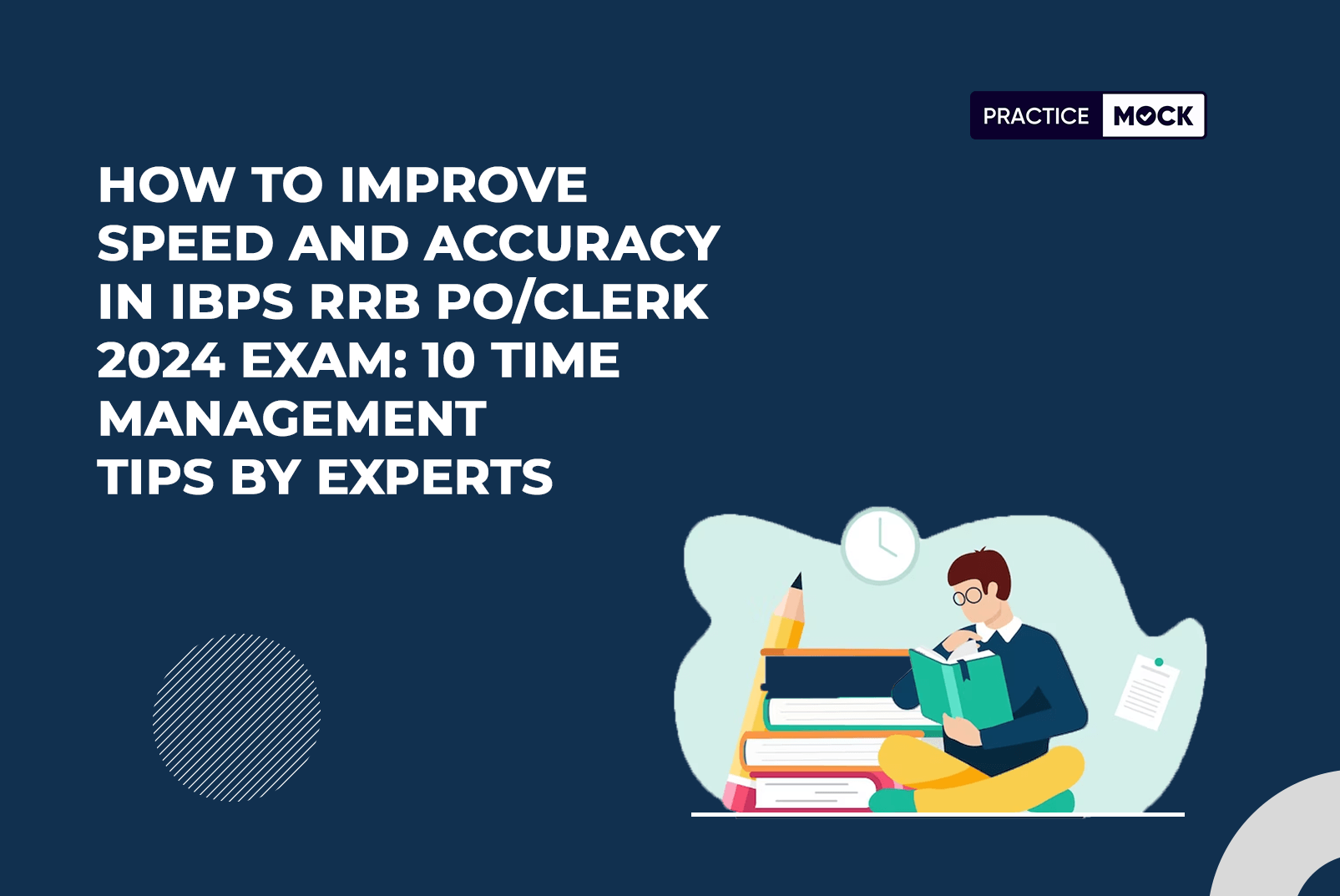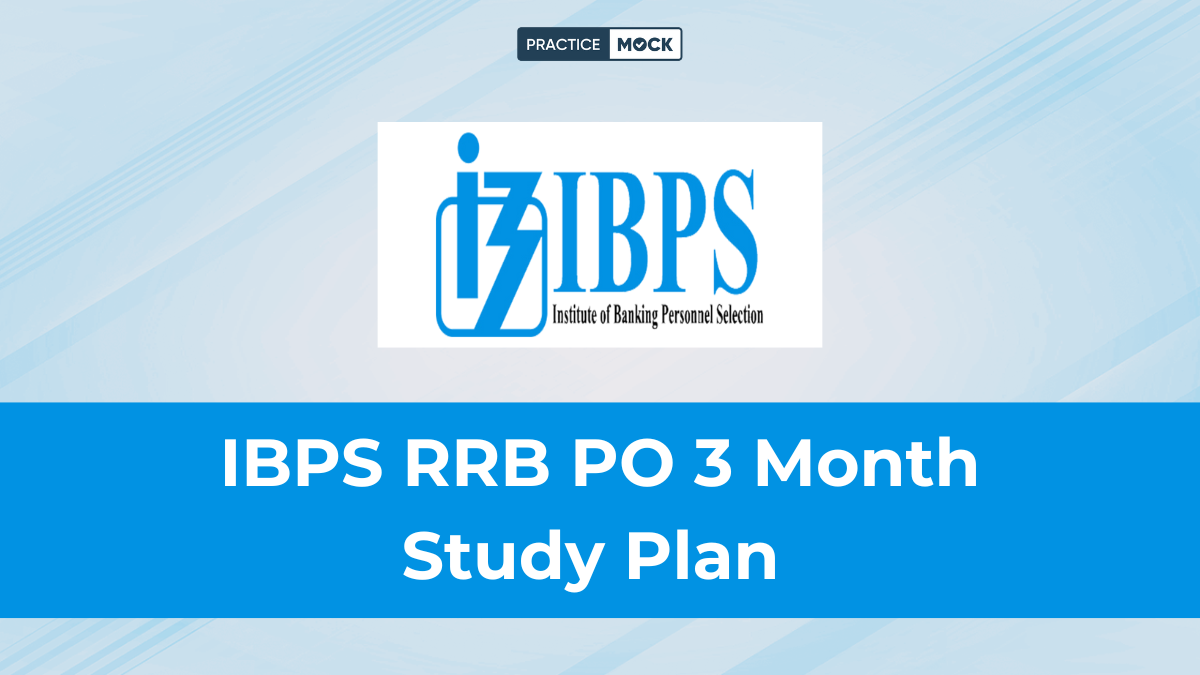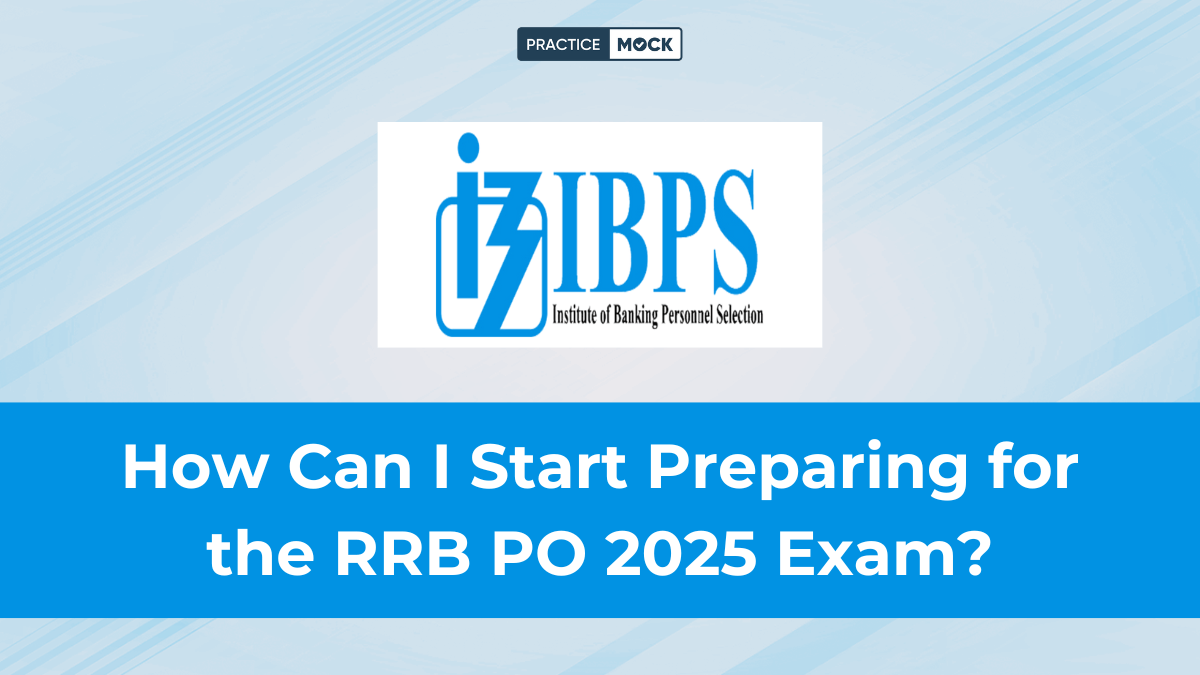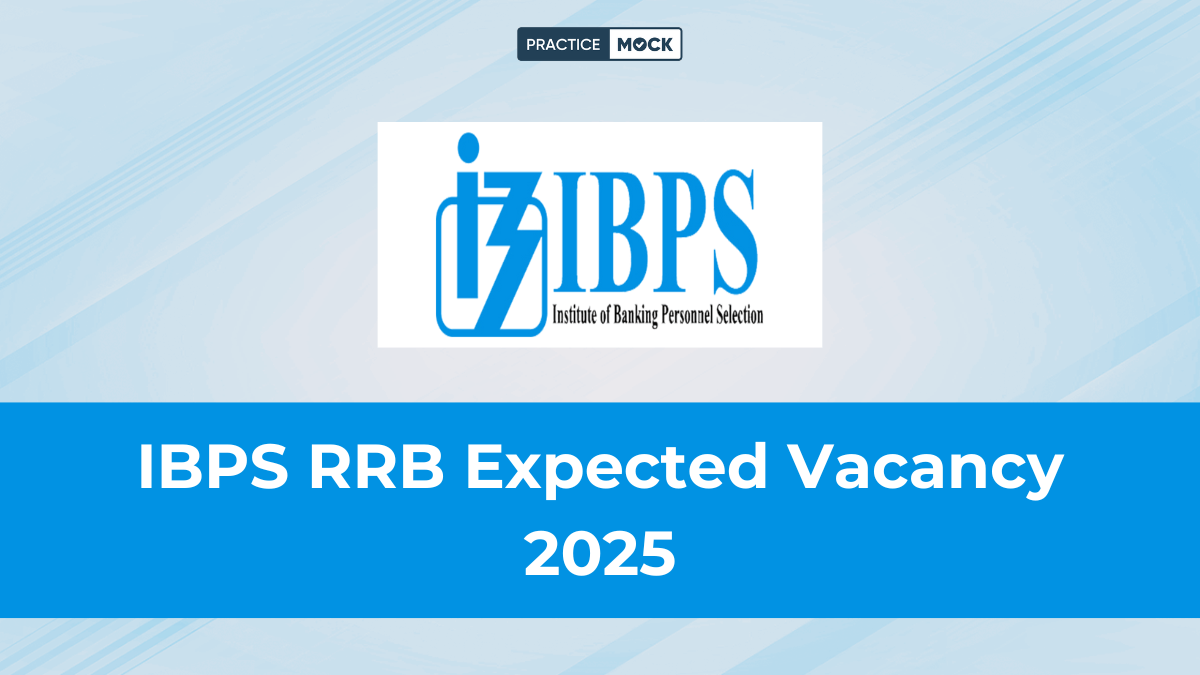How to Improve Speed and Accuracy in IBPS RRB PO/Clerk 2024 Exam: 10 Time Management Tips by Experts


As you gear up for the IBPS RRB PO/Clerk 2024 exam, there’s one crucial factor that often determines success: time management. You may find yourself grappling with questions like, “How can I utilize the limited time efficiently?” or “How do I strike the perfect balance between speed and accuracy?”
In the fast-paced world of competitive exams, every second counts. With the clock ticking relentlessly, mastering the art of time management becomes paramount.
Today, we’re unveiling 10 expert-backed time management tips straight from the playbook of successful candidates. These invaluable insights will not only streamline your study routine but also optimize your performance on IBPS RRB PO/Clerk 2024 exam day.
💁♀️Click Here to Take 1 FREE RRB PO Mock Test now and Utilize the Power of Expert time management 📈🕒🏆
How to Improve Speed and Accuracy in IBPS RRB PO/Clerk 2024 Exam: 10 Time Management Tips by Experts
Here are the 10 expert tips to help you ace the IBPS RRB exam with finesse, optimizing both your speed and accuracy:
Tip 1: Know the exam pattern and syllabus well
Understanding the structure of the IBPS RRB PO/Clerk exam is crucial. There are three parts: Preliminary, Main, and Interview. In the Preliminary phase, you’ll face two sections: Reasoning and Quantitative Aptitude, each with 40 questions. The Main phase is more comprehensive, covering five sections: Reasoning, Quantitative Aptitude, General Awareness, English/Hindi Language, and Computer Knowledge, with 40 questions each. The Interview phase comes after the Main exam for those who qualify, and it carries 100 marks. Knowing the content, difficulty level, and weightage of each section will help you plan your study schedule effectively.
Example: Asif, an RRB aspirant, spent considerable time understanding the exam pattern and syllabus. By doing so, she realized that although the Quantitative Aptitude section was challenging for her, it carried significant weightage. Therefore, she dedicated more time to mastering this section, ultimately improving her overall performance in the exam.
Tip 2: Practice mock tests regularly
Mock tests serve as invaluable practice sessions, allowing you to gauge your speed, accuracy, and overall performance. They simulate the exam environment and help you identify your strengths and weaknesses. Regular practice with mock tests enhances your time management skills and boosts your confidence levels. Aim to take at least one mock test every week and analyze your performance to pinpoint areas for improvement.
Example: James diligently practiced mock tests every weekend leading up to the exam. Through consistent practice, he identified that he struggled with time management in the Reasoning section. By recognizing this weakness early on, James developed strategies to allocate his time more efficiently, ultimately improving his performance on exam day.
Tip 3: Revise the important concepts and formulas
Revision is the cornerstone of exam preparation. Regularly revisiting crucial concepts and formulas reinforces your understanding and retention. Create concise notes summarizing key points for quick reference. Additionally, stay updated with current affairs, banking knowledge, computer proficiency, and language skills, as these are integral to scoring well in the General Awareness and Interview sections.
Example: Priya maintained comprehensive notes covering essential formulas and concepts across all exam subjects. She allocated dedicated study sessions to review these notes regularly. This disciplined approach not only solidified her understanding but also boosted her confidence in tackling a wide range of questions during the exam.
Tip 4: Solve previous year papers and sample papers
Practicing with previous year papers and sample papers provides insight into the exam’s format, question types, and difficulty level. It familiarizes you with the exam environment and helps you manage your time effectively. Aim to solve at least one previous year paper or sample paper daily, and compare your answers with the provided solutions to track your progress.
Example: Rahul made it a daily habit to solve one previous year paper before starting his regular study sessions. By consistently practicing with past papers, he gained a deeper understanding of the exam pattern and honed his problem-solving skills, significantly boosting his confidence for the actual exam.
Tip 5: Learn shortcuts and tricks
Discovering shortcuts and tricks can significantly enhance your speed and accuracy in solving exam questions. Explore various resources, such as online platforms, books, or coaching classes, to learn effective strategies for tackling different question types. Regular practice and application of these techniques during mock tests and practice sessions will reinforce your proficiency.
Example: Deepak struggled with time constraints while solving complex mathematical problems. Upon learning time-saving shortcuts for calculations, he practiced them diligently until they became second nature. As a result, Deepak experienced a marked improvement in his speed and accuracy, particularly in the Quantitative Aptitude section.
Tip 6: Manage your time wisely
Efficient time management is crucial for optimizing your performance in the exam. Allocate your time judiciously to each section and question based on their difficulty level and weightage. Maintain a steady pace throughout the exam, keeping track of the time to ensure completion within the allocated duration. Reserve some time at the end for review and correction.
Example: Aakash devised a time management plan allocating specific time slots to each section based on its weightage. During the exam, he adhered to this plan meticulously, ensuring he had ample time for every question. This strategic approach enabled Aakash to complete the exam comfortably and even revise his answers before time ran out.
Tip 7: Attempt the easy questions first
Prioritize tackling the easy questions at the beginning of the exam to secure quick marks and build momentum. As you progress, gradually tackle the more challenging ones. If a question seems too difficult or time-consuming, skip it temporarily and return later if time permits. This approach minimizes the risk of missing out on easy points due to time constraints.
Example: Tina followed the strategy of tackling easy questions first during her exam. By quickly completing the straightforward questions, she gained confidence and momentum, which propelled her through the more challenging sections. This approach ensured she maximized her score within the stipulated time frame.
Tip 8: Read the questions carefully and avoid silly mistakes
Take your time to read and understand each question thoroughly before attempting it. Pay close attention to details, calculations, units, and language to avoid making careless errors. Double-check your answers for accuracy and correctness before moving on to the next question. Vigilance and attention to detail can prevent unnecessary loss of marks due to avoidable mistakes.
Example: Rajiv fell victim to a calculation error during his practice sessions, which cost him valuable marks. Determined to avoid similar mistakes in the exam, he adopted a habit of reading each question carefully and cross-checking his calculations before marking his answers. This meticulous approach ensured he maintained accuracy and minimized errors during the exam.
Tip 9: Stay calm and confident
Maintain a calm and composed demeanor throughout the exam, regardless of any challenges or setbacks you encounter. Trust in your preparation and abilities, and approach each question with confidence. Refrain from succumbing to stress, anxiety, or panic, as they can impair your performance. Stay focused, positive, and resilient, knowing that you’ve done your best to prepare.
Example: Maya faced unexpected technical glitches during her exam, causing initial panic and anxiety. However, she quickly regained her composure, reminding herself of her diligent preparation and hard work. With a calm and confident mindset, Maya tackled the exam with determination, ultimately overcoming the obstacles and performing admirably.
Tip 10: Follow a healthy lifestyle
Prioritize your physical and mental well-being during the preparation phase and leading up to the exam. Maintain a balanced diet, stay hydrated, engage in regular exercise, get adequate sleep, and practice relaxation techniques such as meditation or deep breathing. A healthy lifestyle enhances your overall resilience, energy levels, concentration, and cognitive function, ensuring you’re in optimal condition to excel on exam day.
Example: Rohan understood the importance of maintaining a healthy lifestyle to support his exam preparation efforts. He incorporated nutritious meals, hydration, and regular exercise into his daily routine, along with relaxation techniques to alleviate stress. This holistic approach not only boosted Rohan’s physical and mental well-being but also enhanced his focus and productivity during study sessions, ultimately contributing to his success in the exam.
Takeaway
Preparing for the IBPS RRB PO/Clerk exam requires more than just studying hard. It demands strategic planning and effective time management. The insights shared above offer a roadmap to navigate this challenge successfully. By mastering the exam pattern, embracing regular mock tests, revising key concepts diligently, solving past papers consistently, adopting time-saving techniques, managing time wisely, approaching questions strategically, avoiding careless errors, maintaining composure, and prioritizing your well-being, you equip yourself with the arsenal needed to conquer the exam. Integrate these strategies into your study routine, viewing them as pillars of support on your journey to success. With each application, you inch closer to your goal, armed with the confidence and skills needed to excel in the exam.
So, seize the opportunity, embrace the challenge, and trust in your abilities. Remember, success lies not just in what you know, but how effectively you manage your time and resources. Keep pushing forward, and let your determination guide you to triumph.
Best of luck as you embark on this transformative journey towards your banking career aspirations!
Recent Posts
Best Tips to Make RBI Grade B Revision Notes
Master the art of creating effective RBI Grade B revision notes with these expert tips!…
Static GK for SSC CGL Exam, Free Topic Tests, Download PDF
In this blog, we have provided the Static GK for SSC CGL Exam. Practice free…
500+ Current Affairs for SBI Clerk Mains 2025 Exam
In this article we are providing 500+ Most Probable GA Question PDF For SBI Clerk…
SBI Clerk Scorecard 2025 Out, Check Prelims Score Card Marks
The SBI Clerk Score Card 2025 has been released on their official website, you can…
SBI Clerk Prelims Result 2025 Out, Get JA Result Direct Link
The SBI Clerk Prelims Result 2025 has been released on their official website. Candidates can…
RBI Grade B Study Plan 2025 For 60 Days, Super-Schedule
Looking to clear RBI Grade B 2025? Follow our 60-day super Schedule for expert tips,…



